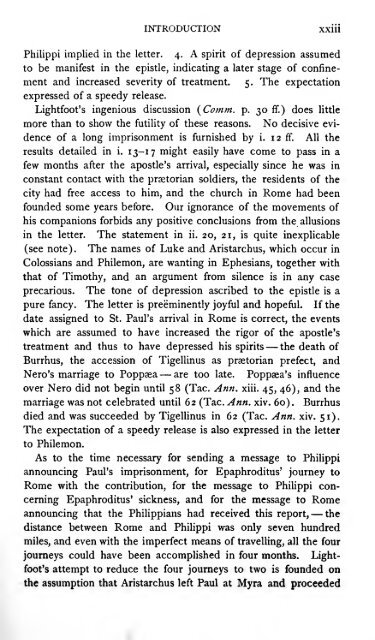Philippians and Philemon - MR Vincent - 1906.pdf
Philippians and Philemon - MR Vincent - 1906.pdf
Philippians and Philemon - MR Vincent - 1906.pdf
Create successful ePaper yourself
Turn your PDF publications into a flip-book with our unique Google optimized e-Paper software.
INTRODUCTION<br />
Philippi implied in the letter. 4. A spirit of depression assumed<br />
to be manifest in the epistle, indicating a later stage of confinement<br />
<strong>and</strong> increased severity of treatment. 5. The expectation<br />
expressed of a speedy release.<br />
Lightfoot's ingenious discussion {Cotnm. p. 30 ff.) does little<br />
more than to show the futility of these reasons. No decisive evi-<br />
dence of a long imprisonment is furnished by i. 12 ff. All the<br />
results detailed in i. 13-17 might easily have come to pass in a<br />
few months after the apostle's arrival, especially since he was in<br />
constant contact with the praetorian soldiers, the residents of the<br />
city had free access to him, <strong>and</strong> the church in Rome had been<br />
founded some years before. Our ignorance of the movements of<br />
his companions forbids any positive conclusions from the allusions<br />
in the letter. The statement in ii. 20, 21, is quite inexplicable<br />
(see note). The names of Luke <strong>and</strong> Aristarchus, which occur in<br />
Colossians <strong>and</strong> <strong>Philemon</strong>, are wanting in Ephesians, together with<br />
that of Timothy, <strong>and</strong> an argument from silence is in any case<br />
precarious. The tone of depression ascribed to the epistle is a<br />
pure fancy. The letter is preeminently joyful <strong>and</strong> hopeful. If the<br />
date assigned to St. Paul's arrival in Rome is correct, the events<br />
which are assumed to have increased the rigor of the apostle's<br />
treatment <strong>and</strong> thus to have depressed his spirits—the death of<br />
Burrhus, the accession of Tigellinus as praetorian prefect, <strong>and</strong><br />
Nero's marriage to Poppaea— are too late. Poppaea's influence<br />
over Nero did not begin until 58 (Tac. Ann. xiii. 45, 46), <strong>and</strong> the<br />
marriage was not celebrated until 62 (Tac. Ann. xiv. 60). Burrhus<br />
died <strong>and</strong> was succeeded by Tigellinus in 62 (Tac. Ann. xiv. 51).<br />
The expectation of a speedy release is also expressed in the letter<br />
to <strong>Philemon</strong>.<br />
As to the time necessary for sending a message to Philippi<br />
announcing Paul's imprisonment, for Epaphroditus' journey to<br />
Rome with the contribution, for the message to Philippi concerning<br />
Epaphroditus' sickness, <strong>and</strong> for the message to Rome<br />
announcing that the PhiHppians had received this report, — the<br />
distance between Rome <strong>and</strong> PhiUppi was only seven hundred<br />
miles, <strong>and</strong> even with the imperfect means of travelling, all the four<br />
journeys could have been accomplished in four months. Light-<br />
foot's attempt to reduce the four journeys to two is founded on<br />
the assumption that Aristarchus left Paul at Myra <strong>and</strong> proceeded





